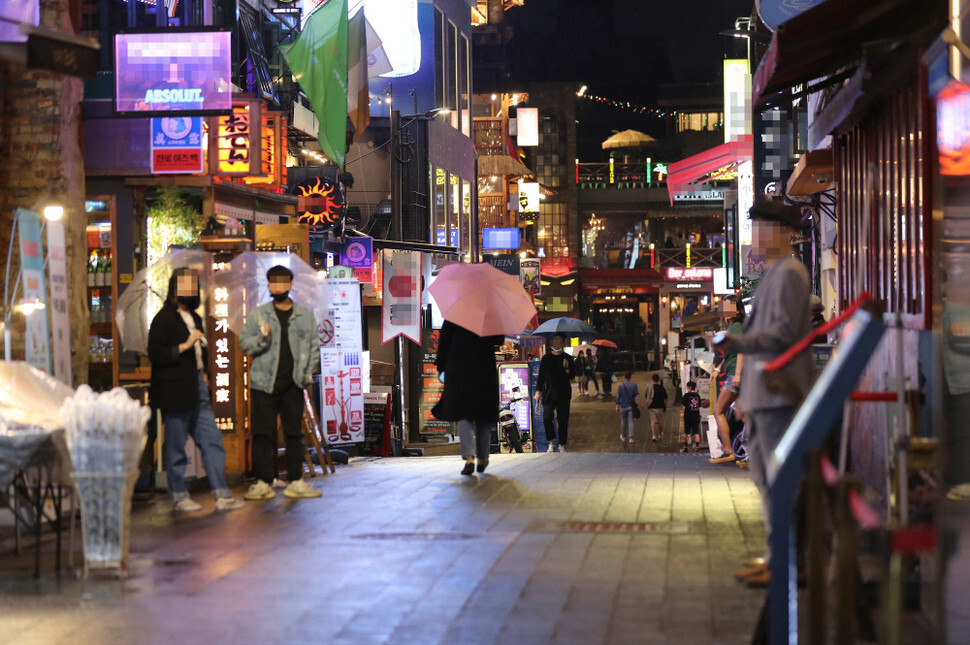hankyoreh
Links to other country sites 다른 나라 사이트 링크
[Editorial] Central government needs to prevent “balloon effect” of country’s nightlife

On May 11, just two days before South Korean students were set to return to schools for their spring semester, beginning with third-year high school students, the Ministry of Education (MOE) decided to delay the back-to-schedule by a week for students at kindergartens and elementary, middle, and high schools around the country.
On Tuesday, disease control authorities reported that the number of COVID-19 cases connected with an outbreak at night clubs in Seoul’s Itaewon neighborhood had exceeded a hundred around the country during the seven days following Children’s Day, on May 5. There has also been a steady uptick of cases in the second wave of transmission.
The authorities have been unable to establish contact with nearly 2,000 visitors to the Itaewon clubs, and 35% of diagnosed patients are asymptomatic, showing that the threat of the “silent spread” of the disease is greater than ever. Since this week is a critical juncture for COVID-19 transmission rates soaring again, delaying the return to schools seems like an unavoidable choice.
But since the back-to-school timeframe has already been delayed five times because of the COVID-19 outbreak, yet another delay increases confusion for students, parents, and schools. It’s particularly harmful for students in their third year of high school. While the educational authorities say this won’t disrupt the schedule of this year’s university entrance exam, it’s bound to create severe anxiety for third-year high school students.
Parents with young children will have to hurriedly make childcare arrangements. This is an unprecedented situation in which the disease control authorities stand on the front line of education. They must take thorough measures to blunt the spread of the infection within a week. Education officials should also take this as an opportunity to make more thorough preparations for the upcoming semester.
It’s a shame that the spring semester has been delayed for a sixth time because of the carelessness of nightclubs and their patrons. But while nightclubs in Seoul and its greater area have been shut down over the holiday and the weekend, nightclubs in other parts of the country apparently brought in the crowds. That means that quite a few people traveled to other cities for their clubbing fix. There were also reportedly huge lines at establishments that are technically registered as “general restaurants” but recreate the clubbing environment by encouraging dancing and flirting.
This is called the balloon effect: push a balloon on one side, and the air bulges out on the other. If the government can’t stop clubbers from migrating to other areas or similar establishments, it will leave a gaping hole in the disease control net.
One by one, local governments have begun to issue bans on gatherings at establishments that are similar to nightclubs. But given the balloon effect mentioned above, effective action needs to be taken by the central government. It goes without saying that the people who’ve visited the clubs in question need to get in touch with the authorities to be tested, so as to protect their health and safety, as well as the health and safety of their families and neighbors.
Please direct comments or questions to [english@hani.co.kr]

Editorial・opinion
![[Column] Season 2 of special prosecutor probe may be coming to Korea soon [Column] Season 2 of special prosecutor probe may be coming to Korea soon](https://flexible.img.hani.co.kr/flexible/normal/500/300/imgdb/original/2024/0426/3317141030699447.jpg) [Column] Season 2 of special prosecutor probe may be coming to Korea soon
[Column] Season 2 of special prosecutor probe may be coming to Korea soon![[Column] Park Geun-hye déjà vu in Yoon Suk-yeol [Column] Park Geun-hye déjà vu in Yoon Suk-yeol](https://flexible.img.hani.co.kr/flexible/normal/500/300/imgdb/original/2024/0424/651713945113788.jpg) [Column] Park Geun-hye déjà vu in Yoon Suk-yeol
[Column] Park Geun-hye déjà vu in Yoon Suk-yeol- [Editorial] New weight of N. Korea’s nuclear threats makes dialogue all the more urgent
- [Guest essay] The real reason Korea’s new right wants to dub Rhee a founding father
- [Column] ‘Choson’: Is it time we start referring to N. Korea in its own terms?
- [Editorial] Japan’s rewriting of history with Korea has gone too far
- [Column] The president’s questionable capacity for dialogue
- [Column] Are chaebol firms just pizza pies for families to divvy up as they please?
- [Column] Has Korea, too, crossed the Rubicon on China?
- [Correspondent’s column] In Japan’s alliance with US, echoes of its past alliances with UK
Most viewed articles
- 1After election rout, Yoon’s left with 3 choices for dealing with the opposition
- 2Why Kim Jong-un is scrapping the term ‘Day of the Sun’ and toning down fanfare for predecessors
- 3Two factors that’ll decide if Korea’s economy keeps on its upward trend
- 4Noting shared ‘values,’ Korea hints at passport-free travel with Japan
- 5AI is catching up with humans at a ‘shocking’ rate
- 6Why Korea shouldn’t welcome Japan’s newly beefed up defense cooperation with US
- 7‘We must say no’: Seoul defense chief on Korean, USFK involvement in hypothetical Taiwan crisis
- 8Exchange rate, oil prices, inflation: Can Korea overcome an economic triple whammy?
- 9Terry Anderson, AP reporter who informed world of massacre in Gwangju, dies at 76
- 10[Reportage] On US campuses, student risk arrest as they call for divestment from Israel